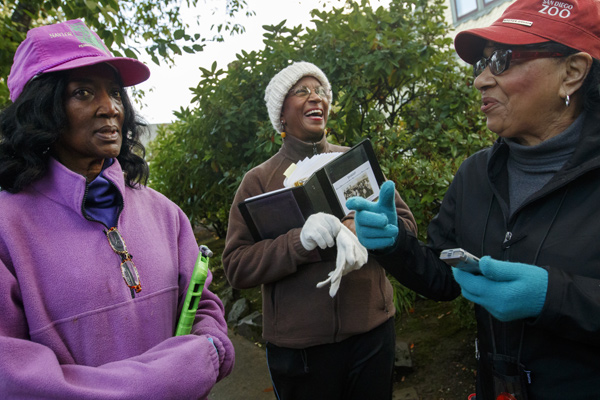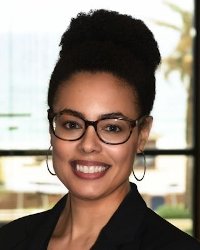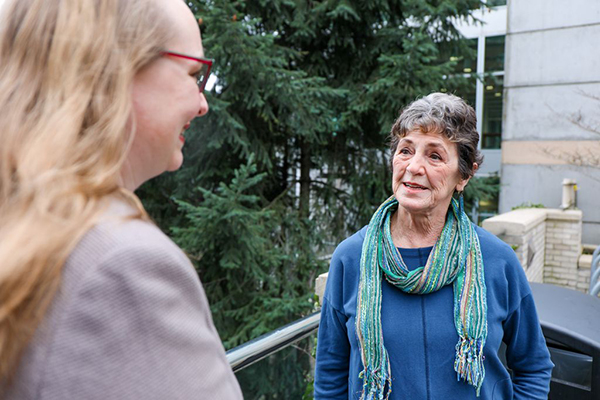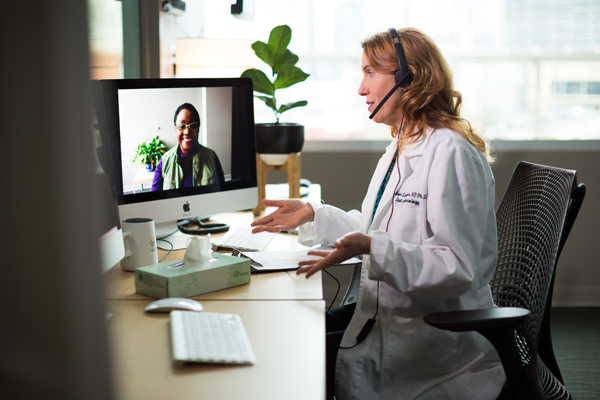For Patients: Alzheimer’s Disease Research
博彩网站’s Layton Aging and Alzheimer’s Disease Center has been a research leader since 1990. The Layton Center:
- Has dozens of scientists seeking new ways to understand aging and treat dementia
- Has produced breakthroughs that help doctors predict thinking and memory problems
- Supports research focused on early detection of Alzheimer’s disease
- Offers patients access to clinical trials of promising new treatments.
Clinical trials
Clinical trials are vital to our research. They allow us to:
- Better understand the aging process
- Understand how brain function changes in people with Alzheimer’s disease
- Test ways to slow or prevent the disease’s progress
- Better understand other forms of dementia
Learn about research opportunities: 503-494-7647 or adresearch@ohsu.edu
Research excellence
At the 博彩网站’s Layton Aging and Alzheimer’s Disease Center, our program includes:
International expertise: Our experts in the Oregon Alzheimer’s Disease Research Center collaborate with other top programs worldwide. We are the only center in Oregon — and among fewer than three dozen nationwide — funded by the National Institute on Aging.
Advanced technology: We helped start the Oregon Center for Aging and Technology. ORCATECH uses technology to assess the health and independence of aging Americans.
Innovative partnerships: We work with 博彩网站’s Oregon Center for Complementary and Alternative Medicine in Neurological Disorders. ORCCAMIND is a leader in complementary and alternative medicine for dementia.
Join ACTNOW
The ACTNOW research registry offers a way to support and take part in studies. Participants in ACTNOW (Alzheimer’s Comprehensive Treatment Network of Oregon and Washington) receive research news. They also get information about taking part in studies on aging and dementia.
博彩网站 research programs
Our scientists are working to discover the causes of Alzheimer's disease, to find treatments and a cure, and to improve care for caregivers. Promising areas of research include:

In-home and wearable technology: Dr. Jeffrey Kaye, Layton Center director, and colleagues are using home sensors and wearable devices to build a one-of-a-kind database on how people age. The devices gather data on older adults’ sleep, mobility, weight and thinking abilities. Researchers can use it to look for health changes, for example, or assess how treatments are working. Learn more about the Collaborative Aging Research Using Technology study.
Caring for caregivers: 博彩网站 won a five-year grant from the National Institute on Aging to find ways to improve the health and well-being of Alzheimer's caregivers. Allison Lindaur, Ph.D., NP, will lead the first of two pilot projects.
Early signs of Alzheimer’s: We are doing clinical trials to see how substances called biomarkers may identify Alzheimer’s early. These biomarkers are found in blood and in the fluid that surrounds the spinal cord and brain. Based on studies by Dr. Joseph Quinn, this research is important because treatment works best when Alzheimer’s is diagnosed early.


Walking and remembering: Participants in this unique clinical trial gather in North and Northeast Portland to walk and reminisce about their neighborhood. The study aims to improve community well-being and cognitive health among older Black people. As a group, Black people have about twice the risk of Alzheimer’s as white people. Raina Croff, Ph.D., oversees the study, Sharing History through Active Reminiscence and Photo-Imagery, or SHARP.
Predicting memory loss: Dr. Lisa Silbert, in work at 博彩网站’s Neuroimaging Lab, found areas in the brain where low blood flow causes damage called white matter lesions. These lesions seem to predict memory problems. Her team’s research could lead to new dementia treatments.

Monitoring early symptoms: 博彩网站 is part of a multi-site clinical trial aiming to prevent Alzheimer's disease years before symptoms develop. The AHEAD study, led by Aimee Pierce, M.D., is testing people at risk of developing symptoms.

Telehealth: Allison Lindauer, Ph.D., NP, studies dementia caregiving and telehealth (health care by phone or video chat). Her team found that virtual visits increase access to care for patients. They also reduce the burden on family members. The team also uses video conferences to educate providers. The Dementia 360 project improves provider confidence in diagnosing and treating dementia.
Botanical medicine: Amala Soumyanath, Ph.D., and Joseph Quinn, Ph.D., are studying how an extract of the herb Centella asiatica affects brain or body processes linked to memory loss. Centella asiatica is traditionally used to improve memory.
Publications
In the last three decades, our team has published more than 800 articles in top scientific journals. Recent articles include:
- Online monitoring of financial capacity in older adults: Feasibility and initial findings
- Age predicts older adults’ driving self-regulation but not dangerous driving behaviors after controlling for executive function
- Serum levels of alpha-Klotho Are correlated with cerebrospinal fluid levels and predict measures of cognitive function
See the list of our published work on dementia, Alzheimer’s disease and other topics. You can also search Elsevier Pure.
Contact us
Learn about opportunities and how to enroll in a clinical trial: